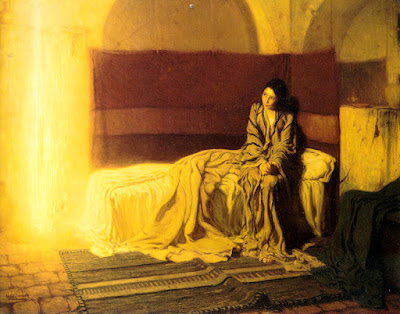Readings: 1 John 3:11-21; Ps 100; John 1:43-51
_____________________________
Today’s readings are so remarkably appropriate
given the condition of our world, given the state of the hearts and minds of so
many.
We seem to be immersed, almost smothered, in a world lacking any kind of spiritual unity, a world too often typified by division and hatred. We watch the news, we scan the internet, read all the social media posts, and we must dig deep to encounter true faith, or to see the signs of hope that should mark our lives.
And how easy it is to add to the divisions and hatreds that increasingly separate us from each other. Families are torn apart because of political differences, or moral confusion, or a simple lack of trust. And the bonds of friendships dissolve for many of the same reasons. So many are simply unwilling to set it all aside and just love each other.
As John, the Apostle of Love, reminds us in his first letter, “Whoever does not love, remains in death.” He’s speaking here of spiritual death, a rejection of everything good, a rejection of God’s call to “love one another as I have loved you” [Jn 13:34].
John goes on to remind us that words mean little unless they are manifested in “deed and truth”, or to use a more common expression: to walk the talk. Who in your life needs the touch of your love, of God’s love? A family member? A friend, perhaps someone who hurt you, someone from whom you have withheld forgiveness? A maybe just a neighbor who irritates you no end? Reach out to them, not to receive anything, simply to extend God’s love.
Often enough we form little personal biases, pre-judgments that are hard to shatter. Just look at Nathaniel in our Gospel passage. Philip told him wondrous things about Jesus, that He is the one promised by God through Moses, a promise every Jew kept in his heart.
“I will raise up for them a prophet like you from among their kindred, and will put my words into the mouth of the prophet; the prophet shall tell them all that I command” [Dt 18:18].
But none of this impressed Nathaniel, who like Philip was probably from Bethsaida, and thought little of folks from Nazareth. The villages of Galilee, places like Bethsaida, Cana, and Nazareth, were just small country towns, subject to the same petty jealousies and rivalries that affect us today.
I lived on Cape Cod for 25 or so years. It's a lovely little slice of God's earth, but the old-timers can be a bit...well, provincial. Here's a local story that displays how rivalries between the small towns manifest themselves:
Two elderly men, both from the town of Chatham and both from old Cape families, were standing at the fence separating their front yards lamenting the number of tourists filling their Chatham streets. One said to the other, "Pretty soon, with all these tourists, there'll be no room for us natives." The other gave a snort and replied, "Natives? I heard that your great-great grandfather was born in Harwich." (Harwich was a neighboring town.)
Yes, those Galilean villages were no doubt similar to our own versions, even here in The Villages. Not long ago, speaking with a woman who lives in a village that abuts ours, she said: “Our village is wonderful. We all love to get together in block parties and holiday celebrations. But I've noticed your village doesn’t do a lot of that.” This, of course, was just a slightly nicer way of saying, “Can anything good come from Nazareth?” [Jn 1:46]
I wish I could say that, meeting me, she immediately changed her attitude. But no, she just continued with more of the same. But not Nathaniel. Philip, accepting his new role as evangelist, said to his friend: "Come and see."
Yes, indeed, come and see Jesus and you will be changed. After only a few minutes with Our Lord, Nathaniel exceeded even Philip:“Rabbi, you are the Son of God; you are the King of Israel” [Jn 1:49].
Declaring what the Spirit has revealed to him, he joined Philip and followed Jesus in "deed and truth.” And this is what every encounter with Jesus is like, or should be like.
Maybe we should spend more time away from all the modern, technological wonders that clutter our lives and our minds, and, like Nathaniel, just sit down for a while under our own figurative fig trees, and let God come to us. How good it is to just experience God’s creation and enjoy the peace that He extends to us.
I think it especially interesting that
in 1st Kings, we encounter the fig tree as a symbol of peace:
“During Solomon’s lifetime Judah and Israel lived in safety…all of them under the vines and the fig trees.” [1 Kgs 5:5]
And in Zechariah, an angel of the Lord assured the high priest with the words:
“On that day you will invite one another under your vines and fig trees” [Zech 3:10].
Our homes and our communities should also be places of safety, places of peace, places on invitation, where love overcomes all conflict. Then we, too, can join the psalmist and “serve the Lord with gladness…give thanks to Him; bless His name” [Ps 100:2,4]



















